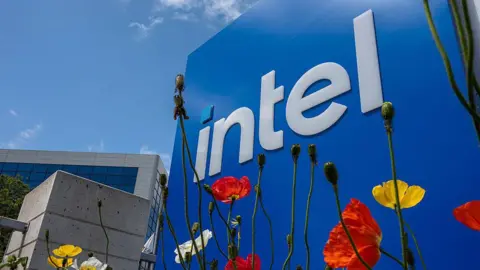**Intel Shares Surge Amid Prospective Investment Talks with US Government**
In a notable turn of events, shares in the semiconductor giant Intel surged by over 7% on Thursday following reports that the Trump administration is in discussions regarding a potential investment stake in the company. This reported interest from the government suggests a newfound commitment to bolster American tech manufacturing and could be pivotal as Intel seeks to establish a major manufacturing hub in Ohio.
**Plans for Ohio Manufacturing Hub Tied to Government Stake**
According to a report by Bloomberg, while the specifics of the possible stake remain uncertain, the proposed deal aligns with Intel’s ambitious plans for the Ohio facility, which is intended to become a central manufacturing site for semiconductor production in the United States. White House spokesperson Kush Desai cautioned that discussions regarding this potential partnership should be treated as speculative until official announcements are made.
The backdrop against which this news unfolds includes a recent meeting between Intel CEO Lip-Bu Tan and US President Donald Trump. Tan had faced criticism from Trump, who previously referred to him as “highly conflicted” due to his past connections with China. This tension highlights the growing scrutiny that can accompany leadership roles in major tech firms, particularly for those with international ties.
**Responses and Industry Opinions**
Following the surge in Intel’s stock price, the company was contacted by BBC News for comments but did not provide specific details regarding the ongoing discussions with the government. However, Intel’s spokesperson emphasized the company’s dedication to supporting initiatives that aim to strengthen the US technology and manufacturing sectors.
Tech analyst David Nicholson from The Futurum Group characterized the potential investment as a “lifeline” for Intel, suggesting that it could provide crucial funding and government backing. Intel has experienced significant challenges in recent years, especially in the context of artificial intelligence advancements, where its competitors, notably Nvidia, have moved ahead rapidly. The company’s market capitalization has dropped from $104 billion (£77 billion) since 2020, indicating a decline in its competitive position.
**Intertwining Government and Private Sector Initiatives**
The discussions around Intel also raise broader questions about the intertwining of government actions and private business interests in the United States. Analysts like Nicholson believe this potential move could mark a strategic alignment aimed at preserving and enhancing the nation’s chip manufacturing capabilities. He noted that while some perspectives may view the support of Intel as unfair, others would agree on its critical importance to the US tech landscape.
Intel’s planned Ohio factory is viewed as a key component of this potential partnership with the government. The ambition is to develop one of the world’s largest semiconductor manufacturing sites, although progress has been hindered by a series of delays.
**A Special Case for Support?**
It’s not typical for the US government to directly finance a single company; however, backing Intel may be justified as an exceptional case, especially considering the competitive pressures from firms like TSMC and Samsung. Austin Lyons, another tech analyst, emphasized that the establishment of the Ohio facility is crucial for the United States to ensure the production of high-end semiconductors domestically. This strategic positioning is seen as vital for maintaining a competitive edge in the global semiconductor market.
In the wake of these developments, Lip-Bu Tan, who assumed leadership of Intel in March, is tasked with navigating both the financial and operational challenges facing the company. In a recent social media post, President Trump’s call for Tan to resign underscored the politically charged environment surrounding Intel, largely due to concerns regarding alleged investments associated with the Chinese military.
**Conclusion**
As discussions continue regarding a potential investment by the Trump administration in Intel, the implications for the tech industry could be substantial. The proposed collaboration signifies not only a potential resurgence for one of America’s most storied technology firms but also a significant shift in how governmental policies may intertwine with private enterprise in the quest to secure the nation’s technological future. Stakeholders will be keenly watching how these negotiations unfold and their impact on the industry as a whole.











